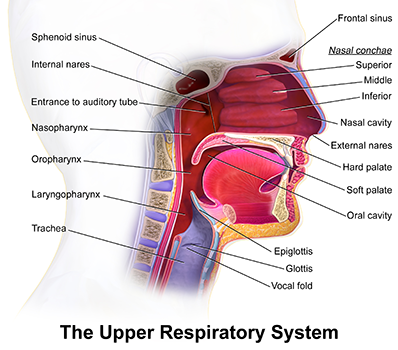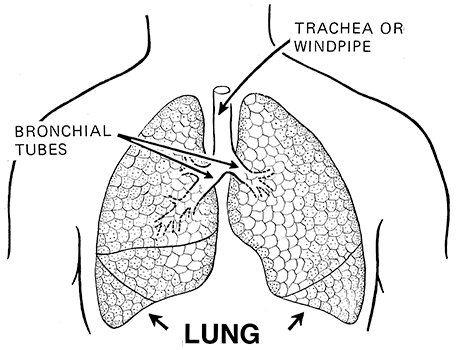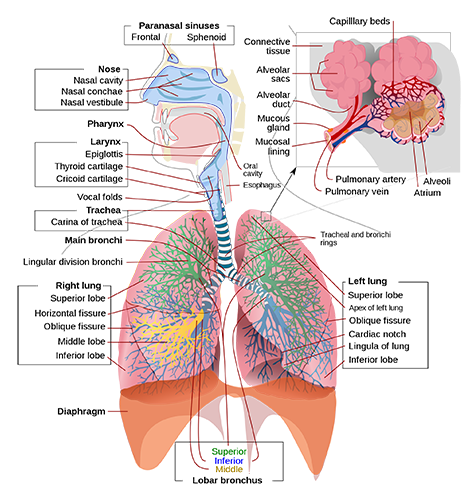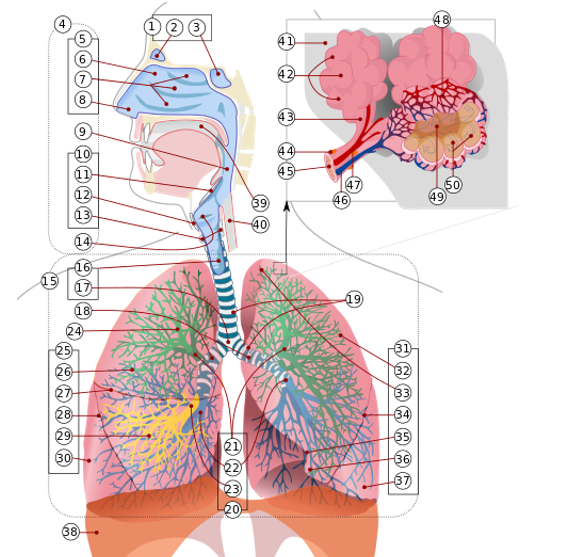Learn

The Two Major Divisions of the Respiratory System
The respiratory system can also be divided into 2 major divisions:
The upper respiratory system includes the nose, pharynx, and larynx.

Image 1 Upper Respiratory System
The lower respiratory system includes the trachea, bronchi, and alveoli (lungs).

Image 2 Lower Respiratory System
Go to Inner Body Website to view illustrations and descriptions of the structures through an interactive animation.
![]() Check Your Understanding
Check Your Understanding
-The respiratory system has 2 major divisions called the upper respiratory system and the _____.
-Which of the following structures do not belong to the upper respiratory system: Nose, Larynx, Trachea, or Bronchi?

Structures of the Respiratory System
The respiratory system structures can be seen in Image 3 Structures of the Complete Respiratory System below.

Image 3 Structures of the Complete Respiratory System
Look over Table 1: Respiratory Structures/Functions and study it before moving on to the "Try It" activity to practice. You will need to be able to identify these on the final Unit 5 Exam.
| Structure | Description/Function |
|---|---|
| Mouth (oral cavity) | external opening for air |
| Nose (nasal cavity) | warms, filters, humidifies air |
| Sinuses | hollow areas of cranium that are lined with mucosa and help with resonance of sound production |
| Pharynx (throat) | air passage (shared with food passage) |
| Larynx (voice box) | vocal cords vibrate to produce sound when air passes over them/epiglottis is a flap of elastic cartilage that closes over this area when swallowing to prevent food/liquids from entering trachea |
| Trachea (windpipe) | open airway to lungs made of cartilage rings/mucus secreted by epithelial cells trap dust and pollutants while the cilia sweeps it up into the esophagus to be swallowed |
| Bronchi (bronchus is singular) | airway tubes from trachea to lung tissue that branch multiple times throughout the lungs |
| Lungs | spongy organs of the respiratory system containing bronchi, alveolar sacs, and capillaries |
| Alveoli | cup-shaped structure in lung tissue containing many capillaries and is the site of gas exchange/Alveoli contain surfactant (an oily secretion lining alveoli to decrease surface tension and keep alveoli form collapsing) - See Image 3 |
![]() Check Your Understanding
Check Your Understanding
-Match the following:
| Structure | Description/Function |
|---|---|
|
|
- Identify the number of the pharynx, larynx, trachea, and alveoli in this image:


